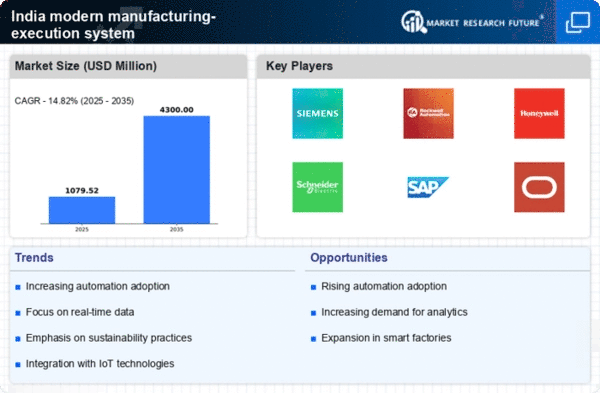Government Initiatives and Support
Government initiatives aimed at boosting the manufacturing sector in India are playing a pivotal role in shaping the modern manufacturing-execution-system market. Programs such as 'Make in India' and 'Digital India' are designed to promote technological advancements and encourage the adoption of modern manufacturing practices. These initiatives provide financial incentives and support for manufacturers to invest in modern manufacturing-execution-systems. As a result, there has been a marked increase in funding for technology upgrades, with estimates suggesting that government support could account for up to 30% of total investments in the sector. This favorable policy environment is likely to accelerate the growth of the modern manufacturing-execution-system market, as manufacturers leverage government resources to enhance their operational capabilities.
Integration of Advanced Technologies
The integration of advanced technologies such as IoT, AI, and machine learning is significantly influencing the modern manufacturing-execution-system market in India. These technologies enable manufacturers to optimize their operations by automating processes and enhancing data analytics capabilities. For instance, the implementation of IoT devices allows for seamless communication between machines, leading to improved efficiency and reduced operational costs. Reports indicate that the adoption of AI-driven analytics in manufacturing is projected to grow by 25% annually in India. This technological evolution not only streamlines production processes but also empowers manufacturers to make informed decisions based on predictive analytics. Consequently, the modern manufacturing-execution-system market is likely to witness increased investments in these advanced technologies as companies aim to enhance their competitive edge.
Rising Demand for Real-Time Monitoring
The modern manufacturing-execution-system market in India is experiencing a notable surge in demand for real-time monitoring solutions. This trend is driven by the need for manufacturers to enhance operational efficiency and reduce downtime. With the increasing complexity of manufacturing processes, companies are seeking systems that provide instant visibility into production metrics. According to recent data, approximately 60% of manufacturers in India are investing in technologies that enable real-time data collection and analysis. This shift towards real-time monitoring not only aids in quick decision-making but also aligns with the broader industry goal of achieving higher productivity levels. As manufacturers strive to remain competitive, the adoption of modern manufacturing-execution-systems that facilitate real-time insights is likely to become a critical component of their operational strategies.
Focus on Quality Control and Compliance
Quality control and compliance are becoming increasingly critical in the modern manufacturing-execution-system market in India. As manufacturers face stringent regulations and consumer expectations for high-quality products, the need for robust quality management systems is paramount. Modern manufacturing-execution-systems are being designed to incorporate quality assurance processes that ensure compliance with industry standards. Data indicates that around 70% of manufacturers are prioritizing investments in quality control technologies to mitigate risks associated with product defects. This focus on quality not only enhances customer satisfaction but also reduces costs associated with recalls and rework. Therefore, the emphasis on quality control is likely to drive the adoption of modern manufacturing-execution-systems that facilitate comprehensive quality management.
Shift Towards Customization and Flexibility
The modern manufacturing-execution-system market in India is witnessing a shift towards customization and flexibility in production processes. As consumer preferences evolve, manufacturers are increasingly required to offer tailored products that meet specific customer needs. This demand for customization necessitates the implementation of flexible manufacturing systems that can adapt to changing requirements. Reports suggest that approximately 55% of manufacturers are investing in systems that allow for greater production flexibility. By adopting modern manufacturing-execution-systems that support customization, companies can enhance their responsiveness to market trends and improve overall customer satisfaction. This trend towards flexibility is likely to continue shaping the market, as manufacturers seek to differentiate themselves in a competitive landscape.
















